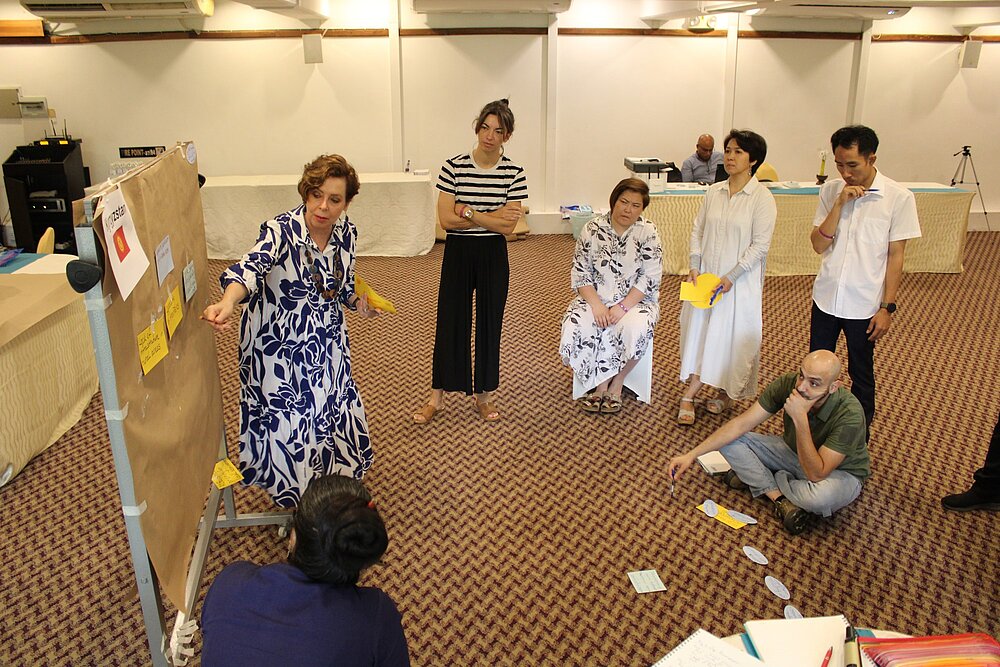In the picturesque setting of Sri Lanka, a transformative seminar unfolded, introducing the Adult Learning and Education System Building Approach (ALESBA) as a powerful tool for building sustainable ALE systems in Asia. The ALESBA seminar, hosted this summer by DVV International’s office in Sri Lanka, welcomed representatives from DVV International and its partner organisations in Asia. ALESBA is being piloted as part of the Asia regional project in Laos, Sri Lanka, Kyrgyzstan, and Jordan. Over five days participants engaged in intensive learning, collaboration, experience-sharing and cultural exchange.
ALESBA’s primary goal is to develop sustainable adult learning and education systems that can provide quality ALE services to empower youth and adults with essential skills and knowledge, integrating adult learning and education into national education strategies. ALESBA looks at four crucial elements of a comprehensive ALE system: an enabling environment, institutional arrangements, management processes and technical processes. Each of these elements has several building blocks that should be in place for the system to function. The seminar marked ALESBA’s debut in Asia, building on its successful implementations in DVV International’s African partner countries, particularly in Ethiopia and Uganda.
Attendees brought diverse experiences, fostering a rich exchange of perspectives and insights. They shared their unique challenges and successes, creating a dynamic learning environment. Participants from all the countries indicated that they face challenges in convincing governments at national level to prioritise adult learning and education (ALE) in policies, strategies and budget allocation, hindering sustainable system development in many countries. Ensuring accessibility and coverage, especially in rural areas, is also difficult. Building strong partnerships with governments, community-based organisations, and other stakeholders is key to addressing these challenges. These partnerships offer vital cross-sectoral support, resources, and expertise. Moreover, contributions from DVV International and its partners provide valuable global perspectives to enhance local ALE strategies.
Participants used their own country as a frame of reference to contextualise the ALESBA tools. They planned activities to ensure they will have sufficient consensus among a wide range of stakeholders to embark on a comprehensive system assessment that will provide baseline data on the status of the current ALE system in each of the four pilot countries.
To build consensus, it is necessary to create a welcoming space where stakeholders can discuss their perspectives on the ALE system. Country representatives tailored engagement strategies to each stakeholder group, considering their preferences and communication styles. This includes activities like workshops, focus groups, or one-on-one meetings to gather input and feedback. Country representatives also contextualised the ALESBA system assessment questionnaires with reference to their own country’s circumstances.
As the seminar concluded, it was evident that it had planted the seeds for future collaborations and initiatives. Once the system assessments are concluded, the four pilot countries will engage in comparative analysis (phase two) and further steps towards phase three of ALESBA, which will lead to the design of an improved ALE system.
Introducing ALESBA to Asia signifies a promising path towards stronger adult learning and education systems and empowered communities. The anticipation is that the four pilot countries will be able to share their experiences with other countries in the region.
About ALESBA
At the heart of the Adult Learning and Education System Building Approach (ALESBA) lies a conceptual framework that captures the elements and building blocks of a comprehensive ALE system. A system is usually understood as an entity composed of different elements, structures and processes, all of which are interconnected and interdependent with feedback loops. In the context of ALE, all the various elements and processes needed to deliver ALE services must be considered. System building includes the process of assessing and diagnosing the system and finding alternatives to redesign/improve the system, test the improved design, make adjustments, and scale up interventions in order to reach a wider target group in a larger geographical area, e.g., nation-wide.
More information and materials on ALESBA can be found in DVV International’s ALE toolbox.




